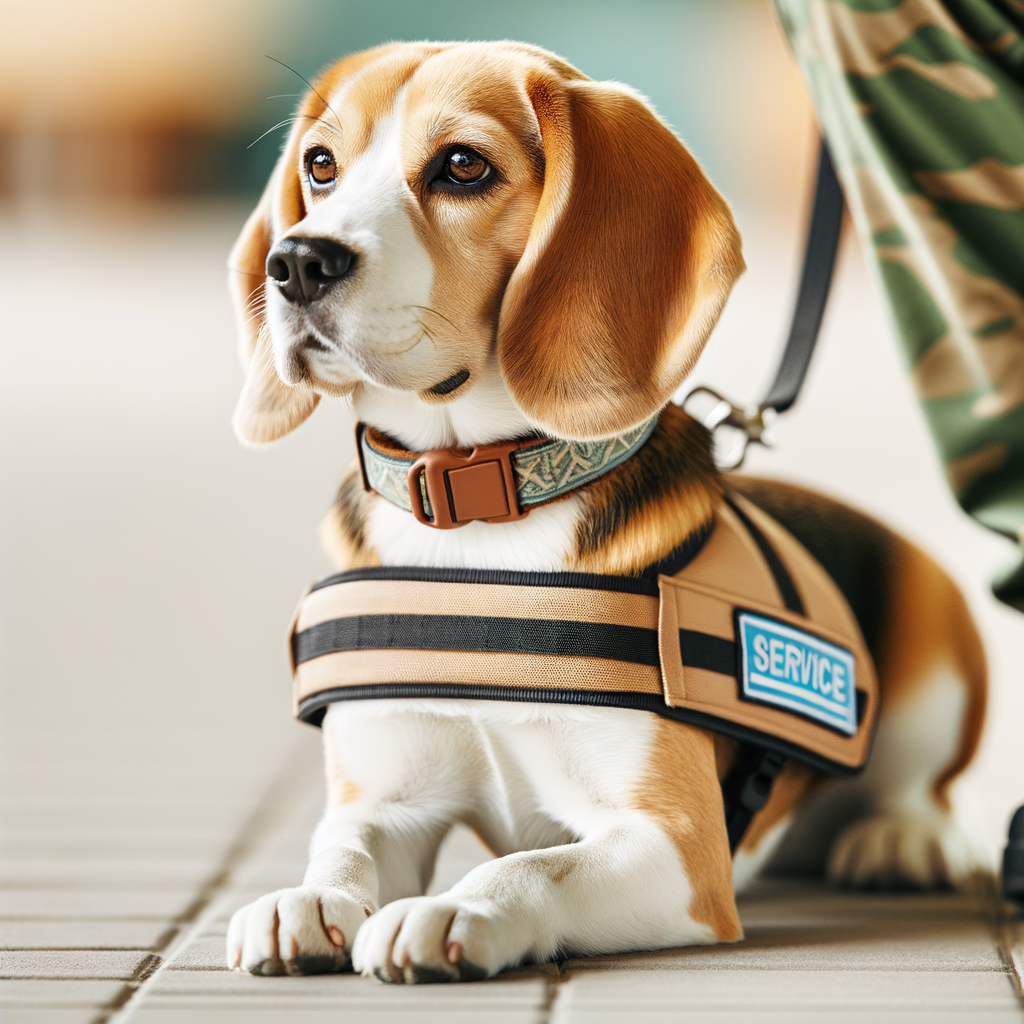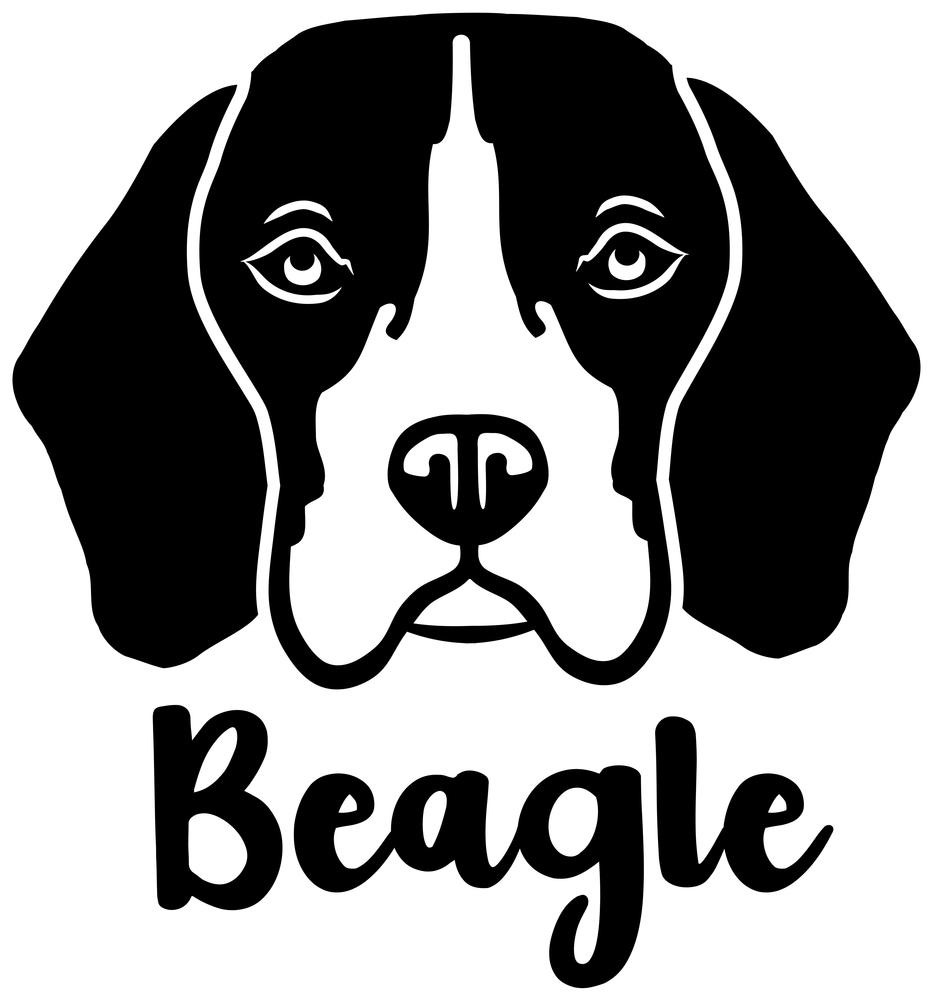
Introduction to Beagle Service Dogs
Service dogs are not just pets; they are trained professionals who provide assistance to individuals with disabilities. Among the many breeds of service dogs, Beagles have proven to be excellent companions. In this article, we will explore the role of service dogs and why Beagles are a top choice for this important job.
- Understanding the role of service dogs
- Why Beagles make excellent service dogs
Service dogs are specially trained to perform tasks that can help individuals with disabilities. These tasks can range from guiding visually impaired people, alerting individuals who are deaf or hard of hearing, pulling a wheelchair, alerting and protecting a person who is having a seizure, reminding a person with mental illness to take prescribed medications, calming a person with Post Traumatic Stress Disorder (PTSD) during an anxiety attack, or performing other duties. Service dogs are more than just pets; they are working animals that require special training and care.
Beagles are known for their keen sense of smell and tracking instinct, which makes them excellent service dogs. They are small to medium-sized dogs, which makes them ideal for indoor environments and for individuals who live in apartments. Beagles are also known for their friendly and gentle nature, making them excellent companions. They are intelligent and eager to please, which makes them highly trainable. According to a study by the American Kennel Club, Beagles are among the top 10 breeds for service work.
In conclusion, service dogs play a crucial role in assisting individuals with disabilities. Beagles, with their keen sense of smell, friendly nature, and high trainability, make excellent service dogs. Whether you are considering getting a service dog or just interested in learning more about them, understanding the role and benefits of Beagles as service dogs is a great starting point.
Understanding the Beagle Dog Breed
Beagles are a popular breed known for their distinctive appearance and exceptional abilities. Let’s delve into the unique characteristics that make Beagles stand out.
Characteristics of Beagles
- Physical attributes: Beagles are small to medium-sized dogs, typically weighing between 20-30 pounds. They have a short coat, usually tricolor or bicolor, with a white-tipped tail.
- Personality traits: Known for their friendly and gentle nature, Beagles are excellent family pets. They are also known for their curiosity and determination, which can sometimes be seen as stubbornness.
- Exceptional sense of smell: Beagles have one of the best-developed senses of smell among dogs, second only to the Bloodhound. This makes them excellent trackers and detection dogs.
- High intelligence and trainability: Beagles are intelligent dogs that can be trained to perform a variety of tasks. However, their independent nature can sometimes make training a challenge.
- Adaptable and friendly nature: Beagles are adaptable dogs that can thrive in various environments. They are also known for their friendly disposition and get along well with other dogs and humans.
- Basic obedience training: Like all dogs, Beagles need basic obedience training to become well-behaved pets. This includes commands like sit, stay, and come.
- Socialization training: Beagles are social dogs that enjoy the company of others. Early socialization training helps them interact positively with other dogs and people.
- Task-specific training: Beagles can be trained for specific tasks, such as detection work, due to their excellent sense of smell and high intelligence.
- Managing their high energy levels: Beagles are active dogs that require regular exercise to manage their high energy levels. Daily walks and playtime are essential for their physical and mental health.
- Addressing their stubborn streak: Beagles can be stubborn at times, which can make training a challenge. However, with patience and consistency, this trait can be managed effectively.
- Guide dogs for the visually impaired: Beagles’ intelligence and trainability make them suitable as guide dogs for the visually impaired.
- Seizure response dogs: Some Beagles are trained as seizure response dogs, where they are trained to assist during and after a seizure.
- Therapy dogs: Beagles’ friendly and gentle nature makes them excellent therapy dogs, providing comfort and companionship to those in need.
- Beagle as a diabetic alert dog: With their exceptional sense of smell, Beagles can be trained to detect changes in blood sugar levels, making them effective diabetic alert dogs.
- Beagle as a PTSD service dog: Beagles can be trained as service dogs for people with Post Traumatic Stress Disorder (PTSD), providing emotional support and performing specific tasks to help manage the condition.
- Recap of Beagle’s suitability as service dogs: With their intelligence, trainability, and friendly nature, Beagles make excellent service dogs for a variety of roles.
- Importance of proper training: Proper training is crucial for Beagles to become effective service dogs. This includes basic obedience, socialization, and task-specific training.
In conclusion, Beagles are a versatile breed that can excel in many roles, from family pet to service dog. With proper training and care, a Beagle can be a wonderful addition to any family or individual’s life.





